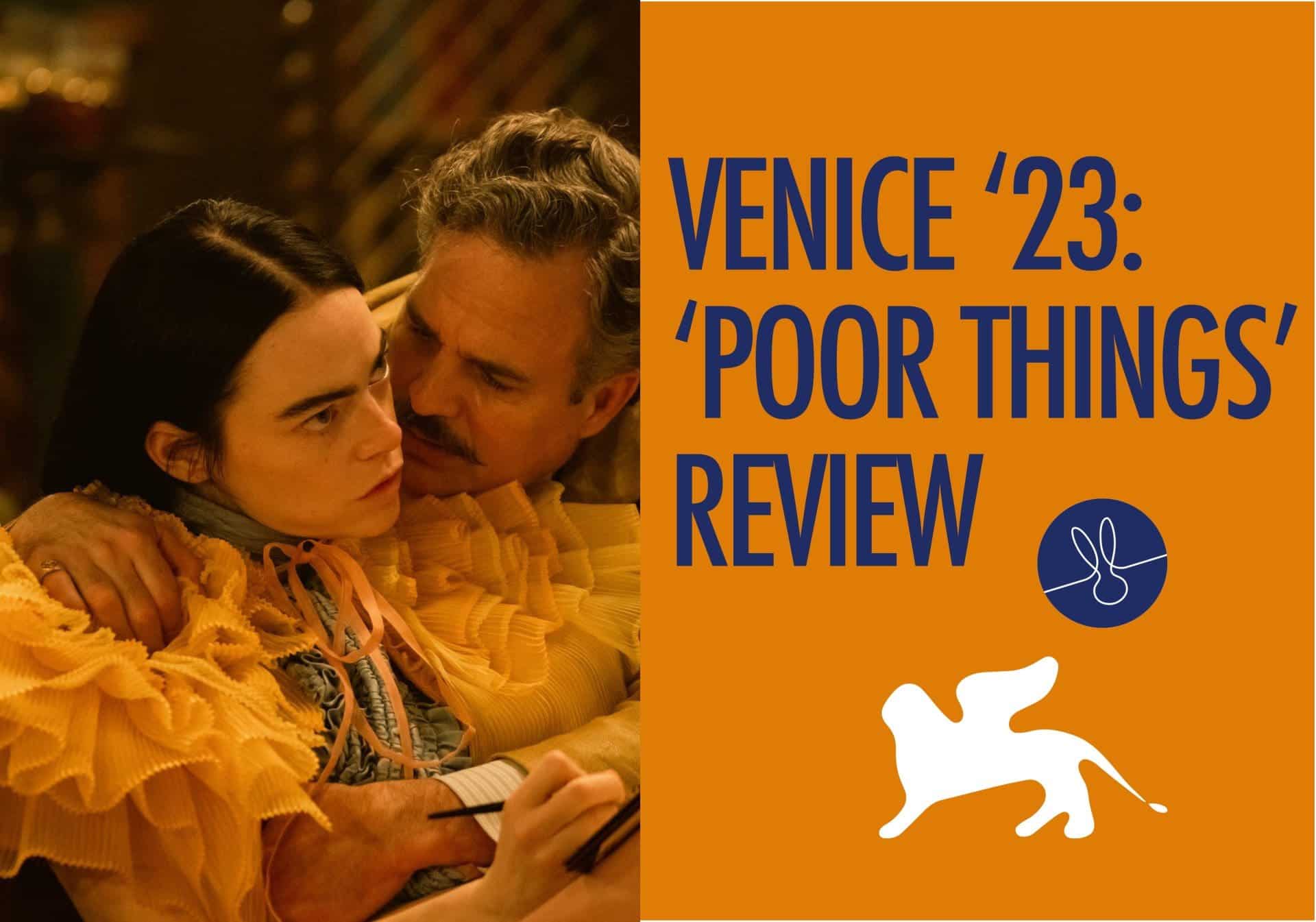
It’s hard not to think of a film like Barbie while watching Yorgos Lanthimos’ latest feature Poor Things. Here are two films featuring a naive but headstrong woman, new to the real world, who slowly discovers her own agency, and can’t quite grasp why she’s having to fight so hard to keep it. But where Greta Gerwig’s smash-hit Blockbuster indulges, effectively so, in bright pinks and camp to get her point across, Lanthimos chooses instead to revel in raunch and vulgarity—and the result is a howling delight.
An adaptation of Alastair Gray’s 1992 novel of the same name, Poor Things opens in Gothic London, styled in monochrome, as an unnamed woman (Emma Stone) ends her life by throwing herself from the London Bridge. That is, until Godwin Baxter (Willem Dafoe), a Frankenstein-esque doctor with severe facial scarring, reanimates her with the brain of her unborn child. He names his creation Bella, and under his care, she both literally and figuratively takes her first steps into the world, her mind that of a toddler but developing at an advanced rate. Soon, she’s introduced to Max (Ramy Youssef), a timid med-student whom “God” recruits to monitor the progress of his experiment. We watch the infant-minded woman, often through a fish-eye lens that exaggerates her childlike gangliness, as she absorbs the world, discovering language, empathy, and, as she reaches mental adolescence, masturbation.
For a time, Bella, Max and God live an idyllic life together. Max quickly falls in love with Bella, and Godwin arranges them to be betrothed. Soon enough, though, Bella’s curiosity begins wandering further and further from the comfy but restrictive confines of their home, and when she’s swept up by smooth-talking womaniser Duncan Wedderbum (Mark Ruffalo), she’s more than happy to oblige his offer to travel the world with him.
What follows is an epic sexual romp that takes Bella from London to Lisbon to Alexandria to Paris, the monochrome of the first act dissolving into vivid colour as she takes in her new surroundings, a newborn seeing the outside world for the first time. She enjoys her first taste of humanity’s greatest obsession, taboo, and weakness when she’s bedded by Wedderbum, and her mind is blown. Emma Stone delivers a career-best as a character who, through her logical simplification of the world around her, ends up seeing it clearer than anyone. As her continued sexual awakening and burgeoning independence threatens to break her free from patriarchal imprisonment, she becomes increasingly baffled at the ludicrousness, greed, and cruelty of “polite society”, and outright rejects it entirely, refusing to take part in the silly affair.
It’s a joy to watch Bella point out the hypocrisy of societal gender norms and illogical social constructs, especially when her barbed words are aimed at Ruffalo’s Wedderbum, whose facade of chivalry and machismo shatters hilariously quickly during his dialectics with Bella, revealing the pathetically insecure man-child hiding beneath the surface. Ruffalo’s performance is outrageously cartoonish, not at all subtle, and exactly what a character like him needs to be: an utter mockery of itself.

A grand, savage takedown of patriarchal double standards, Poor Things is Lanthimos’ most hopeful film. Yes, we adventure on with Bella, experiencing the horrors of the world and the pendant for cruelty of those who inhabit it. But cast an eye on those who show genuine care for her, and a different side of the coin presents itself; Harry Astley (Jerrod Carmichael), a proclaimed cynic, and his comrade Martha (Hanna Schygulla), who take Bella under their wing and teach her of philosophy and literature and ideas; Toinette (Suzy Bemba), a Socialist sex worker who provides tender companionship for Bella during her stint at a brothel in Paris; Godwin and Max, who comes to appreciate the spiritual journey taken on by their beloved experiment. It’s no coincidence that many of these characters themselves live on the outskirts of society. It’s her fellow wretches who ultimately encourage and celebrate Bella’s discovery of self. Unlike many of Lanthimos’ other narratives, which leave us dwelling on the sins and selfishness of humanity, Poor Things keeps too much affection for its central heroine not to offer a glimmer of hope for a brighter future, even as it bares humanity, warts and all. And, behold, by the time the credits roll, it’s a man’s world no longer.
Check out more of our Venice ’23 coverage here!



